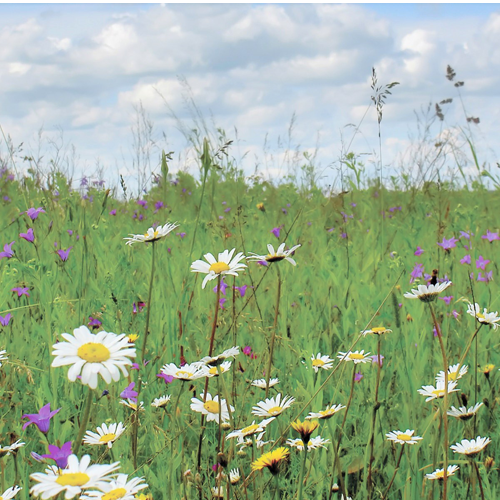EcologyOur ecologists are as passionate about service as they are about wildlife while ensuring legislation and compliance.
Fully licenced and experienced to ensure effective solutions for all your ecological matters.
Our team ensure proactive advice and jargon free explanations, concerning your programme, costs and steps required.
We’re here to do more than advise and support. We’re here to help you keep moving forward whilst we ensure exemplary outcomes. Demand for development land in the UK is increasing and many competing developers are looking for potential sites to build on. Some areas may contain wildlife and habitats that are protected under local, national and international legislation and guidance. There are increasingly serious repercussions of seeking planning permission without consulting a qualified ecologist to first evaluate the site and surrounding area for protected species, not just via legislation but from the impact on public image. It is far more cost effective to follow due process with a commercially minded ecology team who want to help you succeed, but without costing the Earth or depleting its limited wildlife resources. Indeed, keeping even non-protected habitat safeguarded and intact, will save you massive sums of money in clearance and re-landscaping, but will also help deliver 10% + biodiversity net gain.
James Blake Associates will ensure meticulous site organisation in compliance with ecological construction management plans. Our expert ecology team will provide a cost effective, swift, and faultless process that safeguards protected species under criminal law, so you don’t need to worry about inadvertently creating a problem that would delay or cause unexpected costs.
We consistently offer value innovation and enhancements in both service and ecology recommendations, in compliance with CIEEM guidance, while maintaining a commercially practicable result. For example, having ecologists with bat handling and climbing licenses can reduce costs in determining presence or absence of bats through climb and inspect options achieved in one visit. This can remove the need for more costly multi-day ‘stake-outs’ to monitor activity.
Our ecologists also undertake habitat management works to maximise suitability and diversity of receptor sites, or to prevent protected species colonising development sites formerly in agricultural use. We install and inspect wildlife exclusion fencing, design and manage our own receptor sites, as well as ensure detailed input into landscape masterplans and detailed plans for biodiversity enhancements. We are experienced in Biodiversity Net Gain calculation and reporting on how to achieve 10-20% net gain through advise to the landscape team and assessing the final design for this compliance. During the winter, when the survey season is quiet, apart from winter bird surveys and of course badgers, our ecologists are qualified to complete winter clearance and habitat management work.
The team also work with our Management company ‘OASIS’, supervising habitats, maintaining and monitoring protected species populations on residual that land we own.
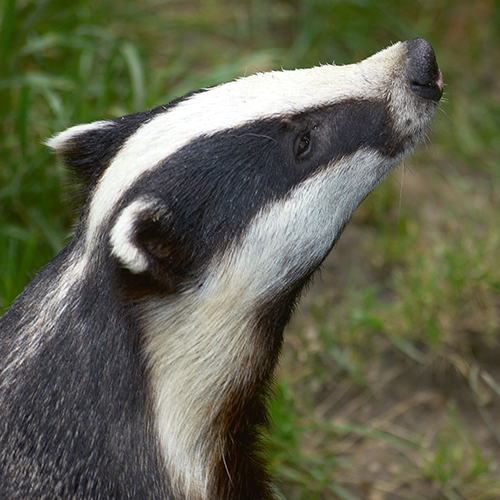
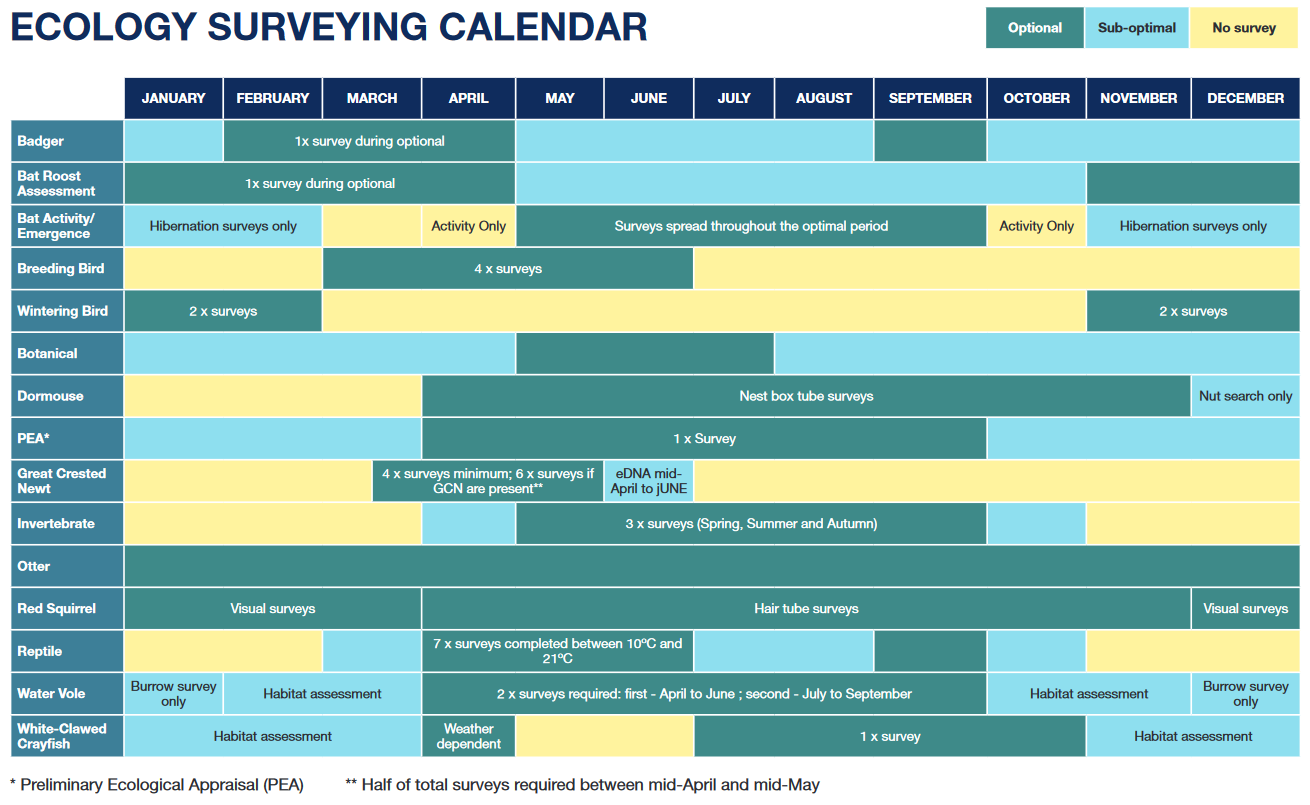
Please download a copy of our ecology calendar to help you plan for survey season.
We can help you with all of the following:
Initial Ecological Walkover Survey/ Preliminary Ecological Appraisal
Initial assessment of a site predominantly for pre purchase agreements or to highlight any ecological features which could be of significance to a development.
Phase 1 Habitat Survey
The survey will assess the site potential to support protected and locally important species and habitats; make recommendations for enhancement, and highlight how features of ecological value should be protected during the works, including legal compliance where necessary. The survey will be conducted or verified by a full member of CIEEM.
Badger Surveys
Badgers are protected under their own specific legislation – the Protection of Badgers Act 1992. They are also protected under Schedule 6 of the Wildlife and Countryside Act 1981 (as amended). The survey will involve assessing the site and surrounding accessible areas up to 30m for potential use by Badgers.
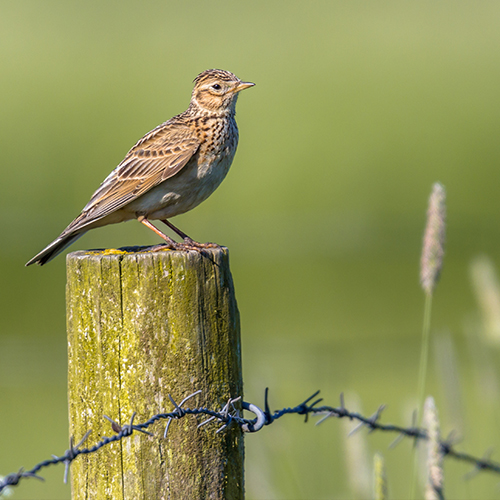
Bat Surveys
There are seventeen species of bats resident to the UK. All of which are protected under the Conservation of Habitats and Species Regulations 2010 and the Wildlife and Countryside Act 1981 (as amended). Bat numbers are in decline due to loss of habitat and foraging area. Our surveys will identify how bats are using or roosting on site. Any trees will be assessed for bat roosting potential and how they may be used on site. Activity, Dusk and Dawn surveys can be undertaken to determine the level of use by bats on a site.
Building inspections can be undertaken to determine whether bats are using them as roosting sites. We are also able to provide Aerial tree roost inspections to determine the level of a roost in a tree.
Breeding Bird Surveys
The Breeding bird survey will conduct an assessment of a site for breeding birds based upon the British Trust for Ornithology’s strategic Breeding Bird Survey.
Wintering Bird Surveys
A wintering bird survey will identify a species composition of a site across the winter months and an estimated population size. The survey is undertaken on sites which may hold species of conservation concern during the winter period.
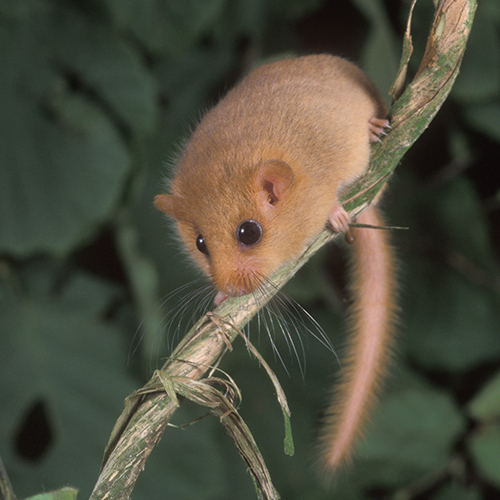
Botanical Surveys
Required to identify all flora on a site with a focus on identifying any rare or endangered plants or habitat.
Dormouse Surveys
Dormice are one of the UK’s most endangered mammals and are European protected. Surveys will identify suitable habitat and how they could be using the area. Nesting tubes can be distributed throughout suitable areas to identify if Dormice are present on site.
Great Crested Newt Surveys
Great Crested Newts are a European Protected Species and should be surveyed to detect if there are any suitable water bodies within.
Invertebrate Surveys
To undertake invertebrate surveys of the site to assess the assemblage of invertebrates and to advise on mitigation/enhancement requirements.
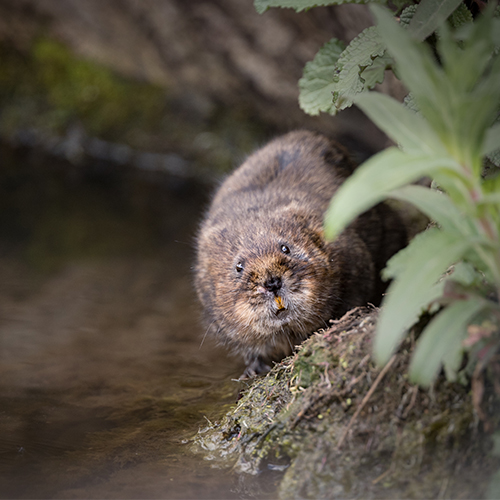
Red Squirrel Surveys
Red Squirrels are the only native squirrel species in the UK, found in an increasingly smaller area of the UK due to competition and diseases from their American cousins, the grey squirrel. We have successfully conducted Red Squirrel surveys throughout the UK, identifying Red Squirrels on a number of sites.
Reptile Surveys
There are six species of reptile which are legally protected in the UK. If a site is deemed to provide suitable habitat for reptiles, a reptile presence/absence survey is recommended. This involves artificial refugia being placed around the site and periodically checked eight times to determine if reptiles are present on site.
Water Vole & Otter Surveys
Water Voles and Otters were at an all time low in previous years but numbers are beginning to increase in certain areas throughout the UK. Surveys identify if either of the species are present along waterways. Both species are protected under Schedule 5 of the Wildlife and Countryside Act 1981 (as amended).
White Clawed Crayfish Surveys
White Clawed Crayfish are protected under Schedule 5 of the Wildlife and Countryside Act 1981 (as amended). Numbers of these species have been decimated in the past by the invasive non-native North American Signal Crayfish. In order to preserve this species surveys can be conducted on waterways to identify the presence of absence of the species.
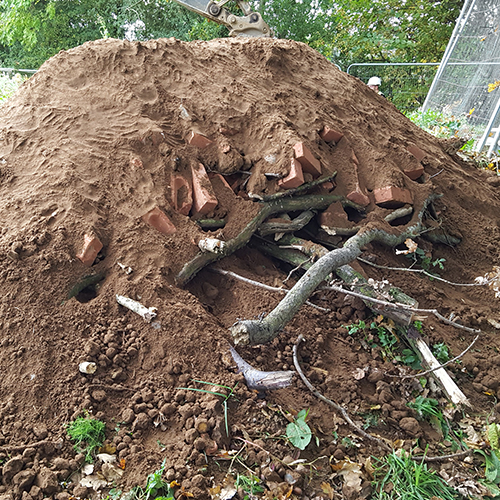
Ecological Design Strategies/ Ecological Mitigation Plans & Reports
Ecological design strategy documents can be required by local authorities to identify how ecological mitigation will be implemented to a site and when. These complex documents detail mitigation for all protected species across a site to ensure that biodiversity is not lost on a site.
License Documents
If a protected species is found on site and will be effected by a development or works, then a license will be required, and this will also need to be sent to Natural England. This will detail how a protected species will be affected and possible mitigation measures. At James Blake Associates, with have a wealth of experience with producing licenses and successfully receiving approval of these on a variety of sites.
Ecological Clerk of Works
If a site has areas of sensitive ecological habitat that requires work, then having an ecologist present to oversee the works can be a requirement to ensure the safety of this habitat. Our ecologists are experienced with working on a variety of sites with contractors to ensure tasks can be completed and ecology protected.
Habitat Creation and Site Maintenance
Habitat creation can form a large part of ecological mitigation for sites where habitats may be lost. This can be in the form of creating wildflower meadows for invertebrates or hibernacula for reptiles. Creating new habitats provide the opportunity to encourage ecology into a development and can be at the centre of any development.
Installation of Nesting boxes
The installation of bat boxes, bird boxes and more, can be an integral part of ecological mitigation. Providing new habitat can encourage these species to use the site and mitigate for any loss of habitat that may be required.
INTEGRITY

